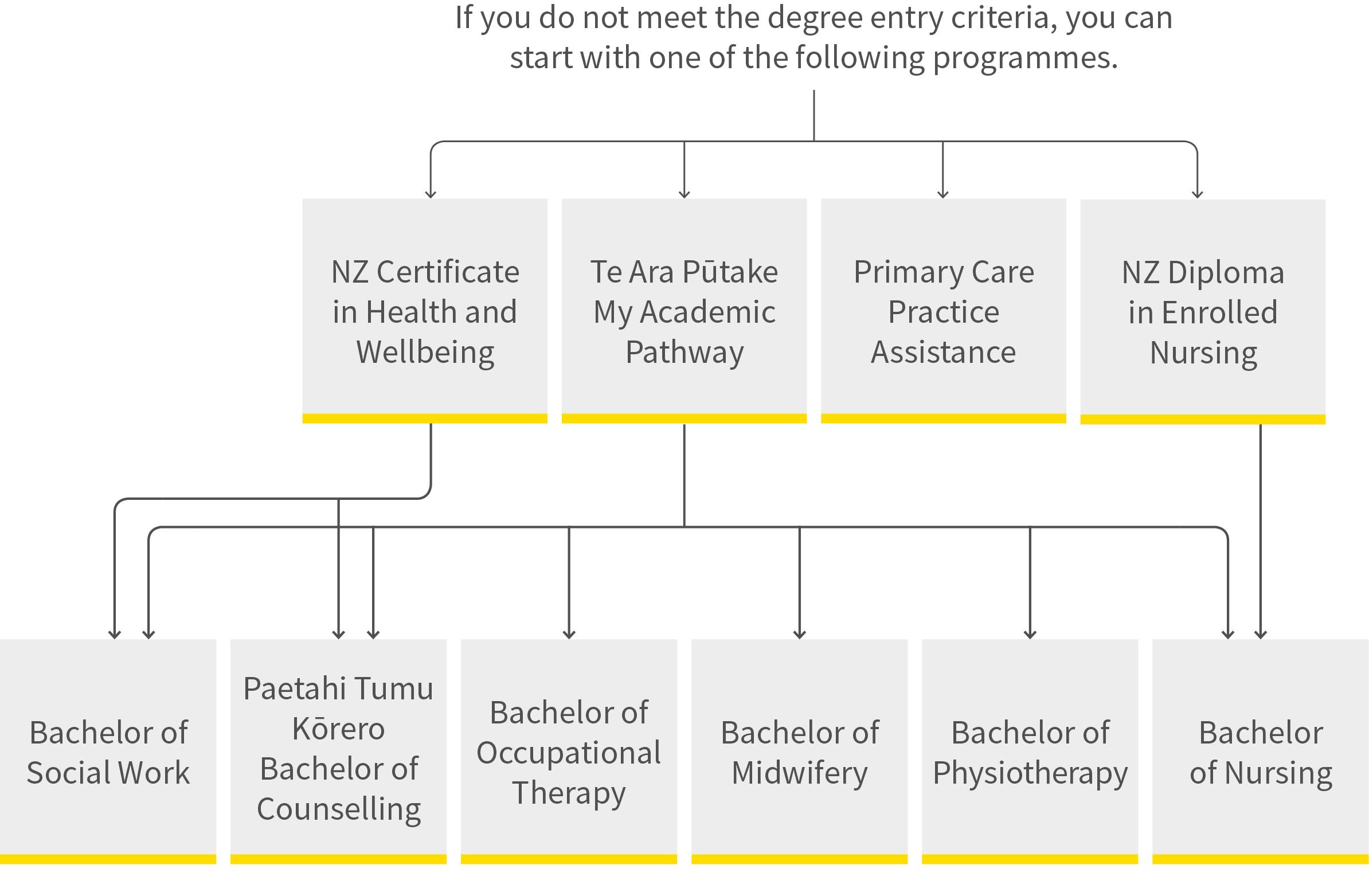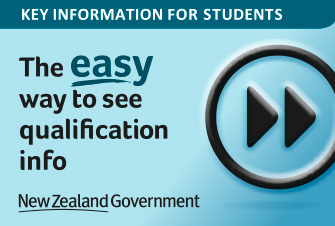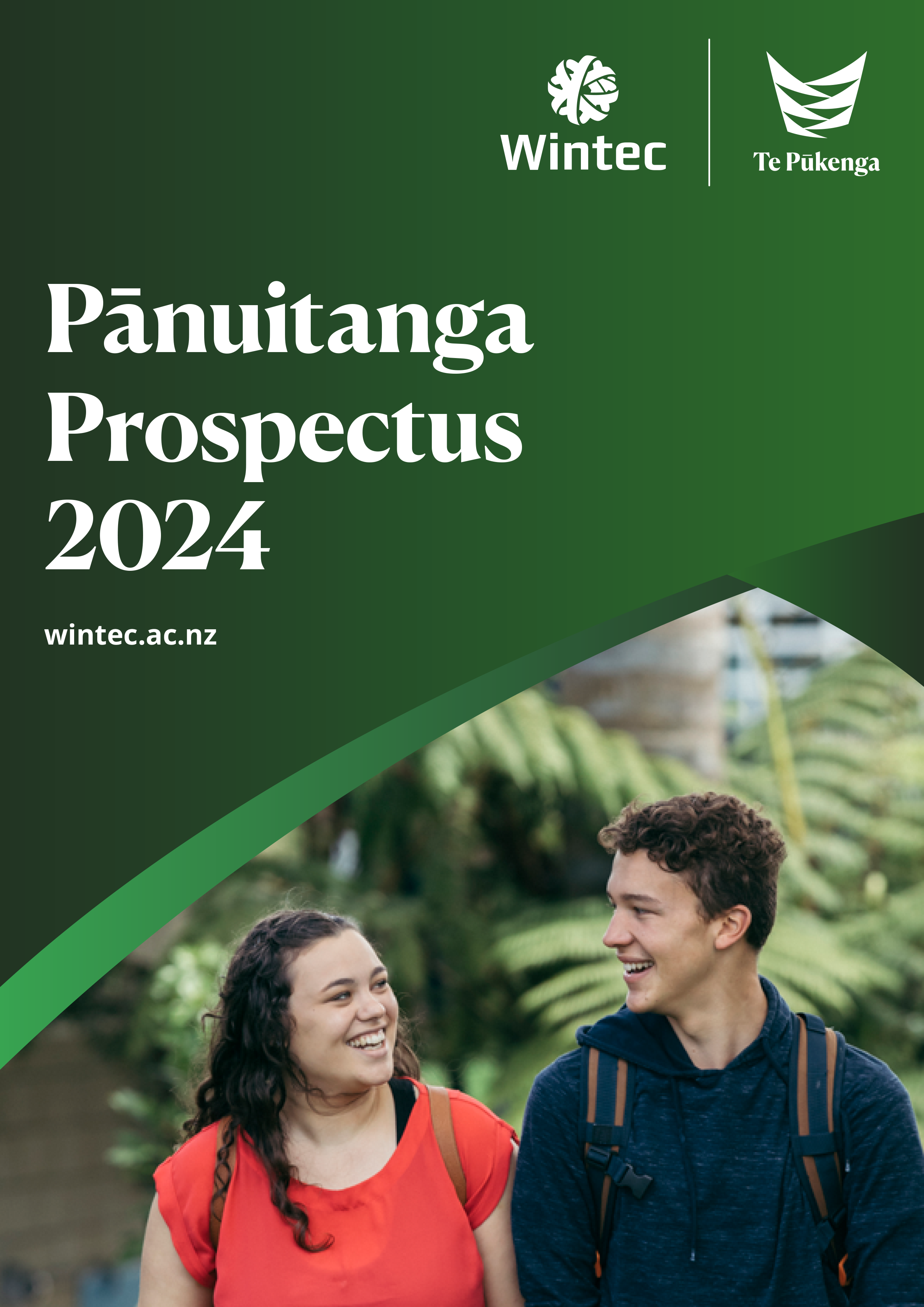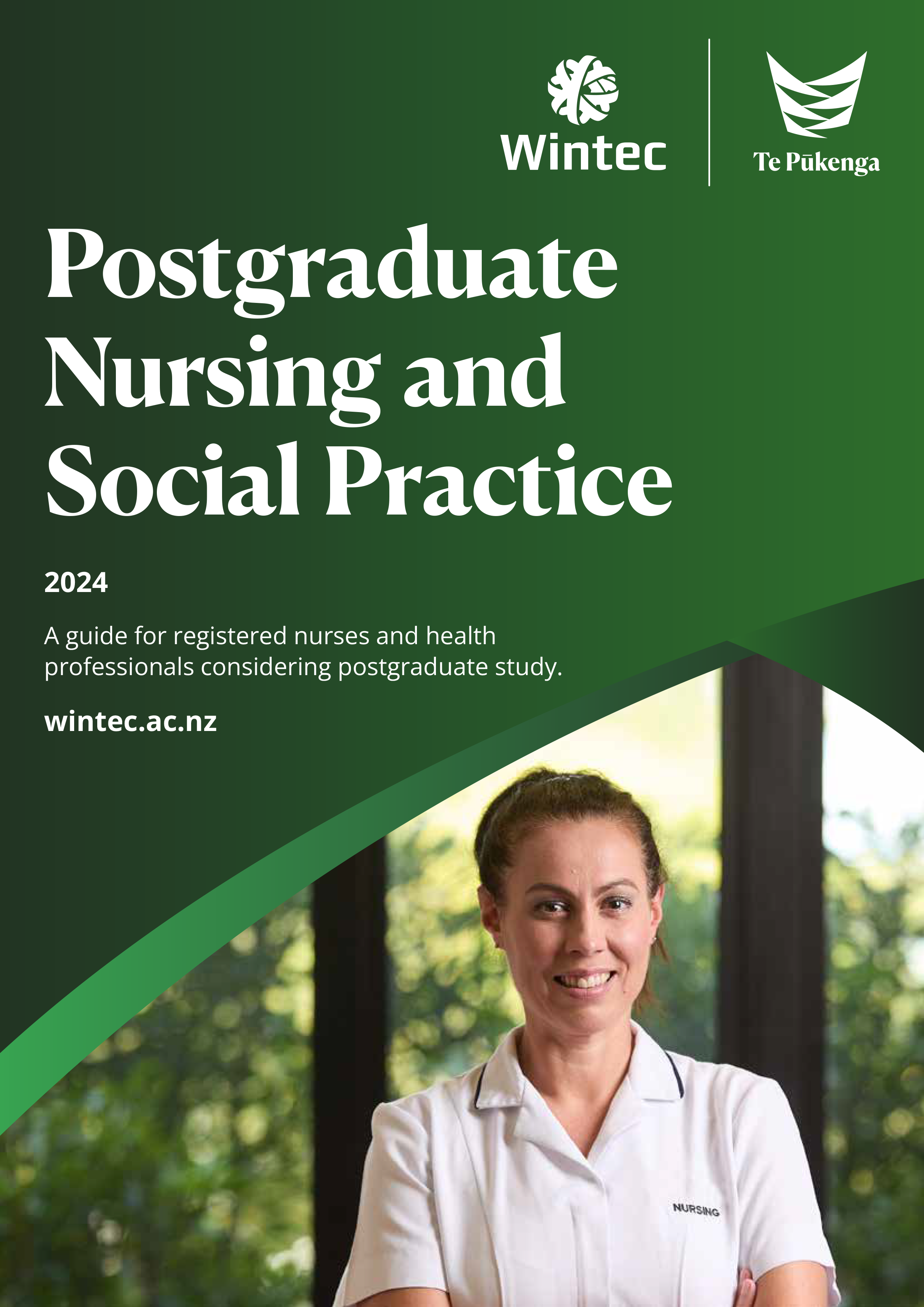Bachelor of Midwifery
HL0901
Course details
-
Feb 2025
- Four years
- Full-time
- $8,027* per year + Additional Costs
- You may qualify for fee-free study under Fees Free Policy
- Level 7
- Available for International Students. International Fee Guideline
- Gisborne, Hamilton City Campus, Hawke's Bay, Rotorua, Tauranga or Whakatane
On-campus block courses are held at our Hamilton City Campus. Attendance at these block courses is compulsory for all students. Further compulsory attendance is required on scheduled Education Fridays at either one of the Wintec regional hubs (Tauranga, Rotorua, Hawkes Bay, Whakatane, and Gisborne) or Hamilton City Campus.
Please note, places on this programme are limited. Applications are preferred by 31 October 2023; however, we will continue to review applications received after this date if spaces are still available.
Summary
This programme is for those who want to learn to confidently nurture and care for women through pregnancy, childbirth, and up to the first six weeks following birth. Students will gain a wide range of knowledge and skills to work autonomously, be fully responsible for the wellbeing of women and babies, and support families safely and appropriately.
Students study full-time and are required to complete the programme within five years, as prescribed by the Midwifery Council of New Zealand (MCNZ). On application to MCNZ, a sixth study year may be approved. The first year is mainly theory-based, with the second and third-year split between practical and theory, and the fourth year is predominantly practical.
Offered across the Midland region, students can enrol to a regional hub in their local area. Please note, students can only sign up for regional hubs if they live in the catchment area of the specific hub and local DHB.
On-campus block courses are held in Hamilton throughout the programme. Attendance is compulsory for all students, due to the intensive, theory-heavy content of these classes. Students are responsible for organising their own transport and accommodation. Block courses take place 11 times in Year 1, for a week at a time. Hours of block days are 8am–5pm, Monday to Thursday, and Friday 8am-12pm. Finishing at lunchtime on a Friday will enable hub students from outside Waikato to travel safely in daylight hours back home.
Compulsory clinical placements and several scheduled tutorials, called Hub Education days, are usually held in regional hubs so that students can complete most of their clinical experience close to home. Students will have to undertake one four-week clinical placement outside their area during their study, usually in either year three or year four.
During the programme, students will be able to apply their knowledge in clinical placements at primary units (eg birth centres), secondary and tertiary DHB hospitals, with self-employed community midwives (LMC midwives), and other community services. Students will have the opportunity to follow women through their pregnancy, labour, birth, and postnatal care. On completion of the programme, students will be required to sit the National Midwifery Examination to become a registered midwife.
This unique programme structure has been designed to provide students with a direct pathway to starting a career as a midwife.
What you will learn
Modules are offered via mixed-mode delivery, so students must have computer competencies and be able to access a computer and the internet.
View programme modules
Level 5 modules
| Module code | Module title | Level | Credits | Pre-requisites |
|---|---|---|---|---|
| HSMW511 | Introduction to Midwifery Knowledge and Skills | 5 | 15 | |
| HSMW512 | Professional and Therapeutic Interaction in Midwifery | 5 | 15 | |
| HSMW513 | Constructions of Knowledge | 5 | 15 | |
| HSMW514 | Human Anatomy and Physiology A | 5 | 15 | |
| HSMW521 | Developing Midwifery Practice | 5 | 15 | HSMW511, HSMW512, HSMW513, HSMW514 |
| HSMW522 | Pregnancy and Birth A | 5 | 15 | HSMW511, HSMW512, HSMW513, HSMW514 |
| HSMW523 | Te Whare Kōhanga - Bicultural Frameworks for Midwifery Practice | 5 | 15 | HSMW512, HSMW513 |
| HSMW524 | Human Anatomy and Physiology B | 5 | 15 | HSMW514 |
| HSMW531 | Mother and Baby Dyad | 5 | 30 | HSMW521, HSMW522, HSMW523, HSMW524 |
| HSMW532 | The Childbearing Year and Midwifery Practice | 5 | 15 | HSMW521, HSMW522, HSMW523, HSMW524 |
Level 6 modules
| Module code | Module title | Level | Credits | Pre-requisites |
|---|---|---|---|---|
| HSMW633 | Pregnancy and Birth B | 6 | 15 | HSMW522 |
| HSMW641 | Continuity in Midwifery Practice | 6 | 30 | HSMW531, HSMW532, HSMW633 |
| HSMW642 | Women's Health Assessment | 6 | 15 | HSMW531, HSMW532, HSMW633 |
| HSMW643 | Women’s Health and Midwifery Practice | 6 | 15 | HSMW531, HSMW532, HSMW633 |
| HSMW651 | Complications and Conditions | 6 | 30 | HSMW633, HSMW642 |
| HSMW621 | Complications and Conditions in Midwifery Practice | 6 | 30 | HSMW641, HSMW643 |
| HSMW661 | Pharmacology for Midwifery | 6 | 15 | HSMW524 |
Level 7 modules
| Module code | Module title | Level | Credits | Pre-requisites |
|---|---|---|---|---|
| HSMW711 | Complexity, Diversity and Frameworks for Midwifery | 7 | 15 | HSMW651, HSMW652 |
| HSMW712 | Complexity and Diversity in Midwifery Practice | 7 | 30 | HSMW651, HSMW652 |
| HSMW771 | Integrating Midwifery Practice | 7 | 60 | HSMW761, HSMW762 |
| HSMW713 | Rangahau and Research Methods for Midwifery | 7 | 15 | |
| HSMW731 | Transition to Practice | 7 | 30 | HSMW771 |
| HSMW732 | Elective Practicum | 7 | 15 | HSMW771 |
Career/further opportunities
Graduates will be eligible to sit the National Midwifery Examination to become a registered midwife. The Bachelor of Midwifery may lead to employment as a registered midwife in the community (self-employed), hospitals, or birthing units.Application process
- Apply online or download and complete an Application to Enrol Form.
- Complete the online Self-Disclosure Form. If you have applied in hard copy, you will need to complete the Self-Disclosure Form, if you have applied online this form is included as part of the online application process.
- If applying in hard copy, and if you are unsure that you meet the entry criteria, complete the Additional Information Form. This will enable us to further assess your application. If applying online, and if you are unsure that you meet the entry criteria, select discretionary entrance and this form is then included as part of the online application process.
- If you have them, provide certified copies of your prior academic transcripts. Find out about supporting material for enrolment here.
- We may also need to verify your identity (your legal name and date of birth) as well as your residency status. If you are a domestic student, we may be able to do this through your National Student Number (NSN), if we can not access your NSN number,
you will need to provide evidence of this by supplying verified copies of your birth certificate or passport.
Once you have submitted your application
- We will email you to confirm we have received your application and let you know if there is anything more we need from you.
- We will assess your application and let you know the outcome.
- If the number of applicants who meet the entry requirements exceeds the available places, applicants will be placed on a prioritised waitlist.
- We will apply an affirmative action approach in regards to applicants who identify as Māori or Pacific and who meet the stated entry criteria.
- If you are accepted to study, we will send you an enrolment offer letter. You will need to accept this to confirm your place on the programme. Click here to find out more about enrolment and accepting your offer.
After you have accepted your offer
- If you do not have a current Comprehensive First Aid Certificate (NZQA units 6400, 6401 and 6402), you will need to complete this before you start the programme. You will not be able to start clinical placements in your first year without the First Aid Certificate.
- At the start of the programme, you will need to provide evidence of your immunity status and declare the vaccinations you have had, as well as providing a medical certificate that confirms you are healthy and fit for clinical practice (eg frequent handwashing will not aggravate hand eczema etc). Your doctor or a delegated authority to a nurse practitioner will need to complete the Immunisation Status and Vaccination Declaration and a medical certificate. Unless these documents are received and the requirements confirmed, you will not be able to start clinical placements.
- During your first week on campus, you will be required to complete a number of safety checks to comply with the provisions of the Children's Act 2014. This means you need to bring your laptop and two identification documents with you (one identification document must be a photo ID such as a birth certificate, passport, firearms licence, certificate of citizenship and your driver's licence, 18 plus card, student ID, IRD card, New Zealand Certificate of Citizenship, or Community Service Card). Please read further information here.
Events
No events.
Disclaimers
Entry criteria
General academic admission
a. Candidates who have no midwifery or nursing qualification must have gained University Entrance, including:
- a minimum of 18 credits at NCEA Level 3 in either biology, or chemistry, or physics; and
- a minimum of 16 credits at NCEA Level 3 or higher in an English language-rich subject (such as English, History, Art History, Classics, Geography, Economics, Religious Studies or Media Studies); and
- a further 16 credits at NCEA Level 3 in an additional approved subject.
b. Candidates aged under 20 years must meet the general academic admission criteria as detailed above.
c. Candidates who have studied on a Midwifery Degree programme at another institution will need to meet the Bachelor of Midwifery programme entry requirements or equivalent. Candidates will only be accepted for year 1, year 2 or year 3 into the programme. They will also need evidence of a B grade average (i.e. above a B minus average) and a letter of recommendation from the Head of Midwifery of the previous programme before they will be considered for admission to the Bachelor of Midwifery programme.
d. Candidates who have completed an approved foundation, bridging or tertiary introductory programme in Health at Level 4, with 50% or higher in four subjects (one module must be science) will be considered for admission to the Bachelor of Midwifery programme.
UE 2020
Applicants who achieved University Entrance through NCEA in 2020 will be assessed under separate NZQA entry requirements that take into account the impacts of COVID-19. Candidates must have gained University Entrance, including:
- A minimum of 16 credits at NCEA Level 3 in Biology, Physics or Chemistry; or a minimum of 16 credits at level 2 biology or chemistry if the applicant has not studied these subjects at level 3; and
- A minimum of 14 credits at NCEA Level 3 in an English language-rich subject (such as English, History, Art History, Classics, Geography, Economics, Religious Studies, or Media Studies); and
- A further 14 credits at NCEA Level 3 in an additional approved subject; and
- Literacy (10 credits at NCEA Level 2 or above made up of 5 credits each in reading and writing); and
- Numeracy (10 credits at NCEA Level 1 or above)
Special admission
a) Domestic applicants aged 20 years or above who have not met the General Admission or entry requirements for a programme but whose skills, education or work experience indicate that they have a reasonable chance of success may be eligible for Special Admission. Applicants will be required to produce:
- Evidence of academic equivalence of the above qualifications; or
- Evidence of ability to study successfully at degree level; or
- Have completed an approved foundation, bridging or tertiary introductory programme in Health at Level 4 with 50% or higher in all modules.
b) Special admission will be granted at the discretion of the Centre Director or designated nominee. Such applicants may be required to successfully complete a foundation, bridging or tertiary introductory programme as a condition of entry into higher level programmes.
Selection criteria
a) Candidates will be required to complete:
- Self-declaration of criminal convictions, and
- Self-declaration of mental and physical condition, and provide
- One written reference
They may also be required to provide additional information and/or attend an interview/hui in order for their application to be assessed.
b) Candidates are required in their application to indicate whether they have been convicted of, or have been prosecuted for, a criminal offence. Candidates should be aware that, under the Health Practitioners Competence Assurance Act 2003 (HPCA Act (2003)), some types of criminal conviction may result in the Midwifery Council of New Zealand refusing to allow a person to register as a Midwife. Similarly, some types of criminal conviction may result in difficulty to obtain a clinical practice placement and therefore meet the requirements to pass the programme.
c) Candidates are required in their application to indicate whether they have had a mental and/or physical condition that may prevent them entering the Bachelor of Midwifery programme. Candidates are required under the HPCA Act (2003) to demonstrate that they are fit for registration as they progress through the programme. Candidates should be aware that, under the HPCA Act (2003), some types of convictions, physical or mental conditions, or professional or academic misconduct, may result in the Midwifery Council of New Zealand being unable to register a person as a Midwife.
d) Candidates are required to indicate in their application whether they hold a full driver’s license and if not, how they will meet the travel requirements associated with the on-call nature of clinical placements.
Safety check requirements
In order to comply with the provisions of the Vulnerable Children’s Act, 2014 and Child Protection Policies for all ‘specified organisations’ providing a ‘regulated service’, all candidates/students will be subjected to safety checks. These will include, but are not limited to;
1) Referee Checks,
2) A Police Vet Check,
3) A Risk Assessment.
Applicants may also be required to attend an interview.
Any unsatisfactory result arising from the full
safety checking process may result in the candidate/student being precluded/declined entry or withdrawn from the programme of study. Furthermore, students must declare any pending or new convictions arising during any stage throughout the entire enrolment period. A conviction or failure to declare a conviction may also result in the student being immediately withdrawn from the programme. Persons who are convicted of ‘specified offences’ will not be accepted onto any programme that requires that person to work in an organisation providing a regulated service.
Clinical practice requirements
a) Before undertaking clinical practice within the programme, candidates will be required to provide a signed Medical Certificate and immunisation status and/or evidence of vaccination from their health practitioner or designated registered health professional.
b) Candidates must hold a current Comprehensive (or full) First Aid Certificate covering NZQA Units 6400, 6401 and 6402 prior to undertaking any clinical practice module in the programme.
c) For registered health professionals entering the programme, a current Annual Practicing Certificate (APC) covers the First Aid Certificate requirements listed in b).
d) Candidates must meet all the clinical passport requirements on Moodle to be able to commence clinical practice placements.
English language requirements
Candidates who have English as an additional language are required to achieve in the International English Language Test System (IELTS) (academic version) with an overall score of 7.0 with not less than 6.5 in writing and comprehension; and not less than 7.0 in speaking and listening. A pass in the Occupational English Test (OET) is either A or B in each section. These scores must be achieved in one sitting of the IELTS or OET test.
What happens if I do not meet the entry criteria?
There are pathways to help you get where you want to be. You could start with the Te Ara Pūtake My Academic Pathway, or if you need to brush up on your science knowledge, we have an online health science module that we can refer you to.
Please note, if you are under 20 years of age, you will not be eligible to apply for entry into the Bachelor of Midwifery unless you have met the requirements of NCEA Level 3.
Pathways

To check what you need to gain entry to a course, review the entry criteria available on each programme page. These assist you in understanding what qualifications or experience are typically required to gain entry. You can contact our team at info@wintec.ac.nz or 0800 2 Wintec at any time for further guidance.
Your first day
Are you ready for your first day of class? Check out your start date and where you need to be. You can also find useful information about studying at Wintec on our welcome page.
Semester 1 2024
Venue: Events Room 1, City Campus
Date: Monday 12 February 2024
Time: 8am-4pm
Venue: To be confirmed, City Campus
Returning students
Please check your timetable to find your first day date.
At induction, we welcome all students with a pōwhiri. Further information about this can be found below.
Prospectus (course guide)
The Wintec Prospectus (otherwise known as a course guide) outlines everything you need to know about Wintec. It contains information about the Wintec campuses, student life, and the programmes that are on offer.
Access your copy of the Wintec Prospectus
The Wintec Prospectus (course guide) is available by downloading the file - click on the document below to access the file. Alternatively, to request a copy via email or the post, please complete the form below.
Request an emailable or printed copy of the Prospectus
Portfolio
Need help? Want to know how to get started?
Leave your details here and we will come back to you:





